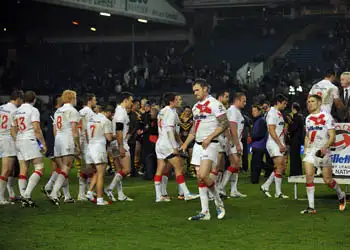How to fix rugby league – Part 2

What the RFL must learn from other competitions around the world if it wants to save Rugby League in Europe.
Click here to view part 1 of this blog
Part 1 of the blog ended with a possible new structure for rugby league.
It’s important to keep in geographical rivals and each team would play the sides in their own division twice – you are in competition with them and your record against your local rivals is the most important. Each side would then play the rest of the teams in their conference once. The remaining four fixtures would be made out from key match-ups from the other conference based on historical rivalry and how each team placed the season before.
This would make the regular season 18 games long. It would be a sprint where teams would never be too far out of contention. Shouts that sides would be given easier rides than others don’t wash. Playoffs even out imbalanced schedules it’s why the whole system was designed. What’s the point of playing every team twice, coming top and then have to enter another competition to see if you’ve won the first? Exactly, there is none. The imbalanced schedule isn’t merely to justify the playoffs. It’s designed to create an exciting, competitive league, based on historical, geographical and talent-level rivals with the playoffs to determine the ultimate champions played out at the Grand Final between the winners of each conference..
Teams will no longer be awarded points for winning. Instead tables will be based simply on their win/loss records with golden points consigning draws to the history books.
Now that about a third of the season has been hacked of the schedule clubs are going to whinge about lost revenue. This is both short sighted and wrong. Firstly how many clubs make money at the moment? Not many is the answer, not very scientific but there you go. Secondly, the increased importance placed on each match should see larger gates across the board. When crowds go up outside interest grows creating a positive spiralling effect that would compensate for the lost revenue form poorly attended, relatively meaningless, fixtures. Overly simplistic? Maybe. Does the NFL suffer from each team only having eight home fixtures a season? No. Is the NFL the world’s most successful league? Yes.
There has been plenty of research into sports marketing and most agree that what is most important for repeat entry (that’s fans coming back in non-marketing speak) is close matches where the outcome of the result is in doubt and where the home team has a reasonable chance of winning. The current structure doesn’t allow for this, save for the odd upset, but try predicting all the winners on any given Sunday in the NFL and then look at a fixture card for Superleague, in SL the same big sides win year after year through virtue of having greater resources available.
Yes certain sides have made great strides in recent seasons but there can be no denying a certain air of familiarity with the sides facing up to each other at Old Trafford every October.
Now comes the good bit, finally you cry after wading through 1,000 odd words. What to do with the extra space in the fixture list and how the national side can benefit.
The best 50 best players in the competition form an elite squad and are split in to two teams of 25. These sides play each other three times during the regular season, much like the State of Origin series in the NRL and only players selected into this side can make it into the England team.
There is even scope for fan involvement at the selection stage. In Major League Baseball fans are invited to vote for players to be included into the annual all-star game. Of course like any internet poll it often descends into a popularity contest but, importantly, it creates debate and publicity without being too much of a gimmick.
The coaches of each side – the England head coach’s assistants – would pick their starting 17 with the rest of each squad made up from players voted on by fans with the every team represented in the 50.
The England coaches would have extended periods of time to work the the best players in the game, England’s best players would be involved in battle-hardening mid-season fixtures while the reduced schedule would increase the intensity and importance of regular season games. All this would help strengthen players ability to cope with the mental side of sport as well as be forced to develop skills to unlock strong evenly matched sides rather than simply over power under-matched minnows.
This last part might prove the hardest to get the clubs to agree with, although making it a prerequisite of being granted a licence could help – that or force clubs out and see the formation of a rival comp – and that is: shared revenue, marketing and the introduction of a draft system.
The final part of this blog will be available on Tuesday!